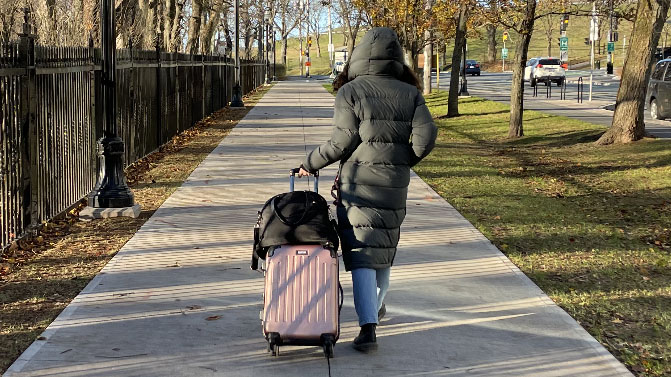Travelling for the holidays? Here’s what you need to know
Rules for re-entering Nova Scotia depend on where you’ve been

caption
COVID-19 rules surrounding holiday travel to and from Nova Scotia depend on your vaccination status, how long you're gone and where you're going.Confused about the rules around travel and COVID-19? If you’re travelling within Canada over the holidays, it’s not that complicated.
But if you’re looking to travel to another country, there’s a lot more to consider.
The federal government has changed the rules for travellers as recently as a few weeks ago, while rules for entering Nova Scotia have largely remained the same since the summer.
Dr. Robert Strang, chief medical officer of health for Nova Scotia, suggested in a Dec. 7 press conference to not travel for the holidays, but no restrictions have been imposed on travel. Related stories
“We are asking people to avoid out of province travel, if possible,” he said. “Especially if they
are not fully vaccinated.”
Leaving and re-entering Nova Scotia
As of Dec. 8, travellers leaving the province should regularly consult the provincial or territorial website for their destination. Each province and territory has specific entry and exit requirements for travellers.
For example, Ontario does not require a test or quarantine period when travelling from another Canadian province or territory.
When returning, Nova Scotia requires all travellers 12 and older entering the province to complete an online check-in form.
The provincial self-isolation requirements are based on vaccination status. Travellers who are fully vaccinated at least 14 days before entering do not need to self-isolate.
The province recommends but does not require COVID-19 testing for fully vaccinated travellers within Canada.
Travellers who are either partially vaccinated or unvaccinated are required to self-isolate for seven days and must test negative for COVID-19 twice before leaving isolation.
For unvaccinated travellers who have fully recovered from COVID-19 in the past 12 weeks, a letter from a provincial public health authority attesting to the recovery will exempt them from the two negative tests required of partial or unvaccinated travellers. They will still have to isolate for seven days.
Children ages 11 and under cannot travel out of province to participate in sports, arts, and culture events such as a performance or sports game. Children aged 11 and under from other provinces cannot enter Nova Scotia for such purposes.
Nova Scotia has a list of limited self-isolation exemptions for travellers entering from another province for specific purposes. Joint custody agreements of children, travel for work, medical or essential veterinary care are some of the reasons that fall under this category.
Leaving and re-entering Canada
Danny Almon of Almon Travel says that travel insurance is the key to successful trip planning.
Almon suggests COVID-related travel insurance for travellers looking to book a trip over the holidays.
“You can’t cancel your trip because of COVID, but if you contract it while you’re down there, at your destination, they have a quarantine protection that helps you out for the time you have to stay,” said Almon.
Travellers leaving the country should refer to the government websites of their destination for up-to-date information on entry requirements.
For example, the United States requires travellers to have proof of a negative COVID-19 test within 24 hours prior to entry into the country.
Upon returning to Canada, entry and self-isolation requirements depend on vaccination status. To be considered as fully vaccinated upon entry, travellers need to have been fully vaccinated for at least 14 days.
Travellers also need to show no signs or symptoms of COVID-19.
A pre-entry negative COVID-19 test is required for travellers over the age of five who have been out of the country for more than 72 hours, regardless of vaccination status.
Canadians who travel out of the country for less than 72 hours do not need to provide a negative COVID-19 test.
A traveller who has proof of a positive COVID-19 test result between 14 and 180 days prior to entry is not required to show proof of a negative test.
The federal government requires all travellers to fill out vaccination, quarantine and travel information up to 72 hours prior to arrival, or on arrival at the ArriveCAN app or website. ArriveCAN will assign travellers a bar code to present upon arrival into the country.
Nova Scotia accepts the ArriveCAN bar code in lieu of the Nova Scotia safe check-in form upon entry into the province.
Partially vaccinated or unvaccinated international travellers are required to quarantine for at least 4 days upon arrival. After day 14, the quarantine period will end if the traveller has no signs or symptoms of COVID-19 and tests negative.
